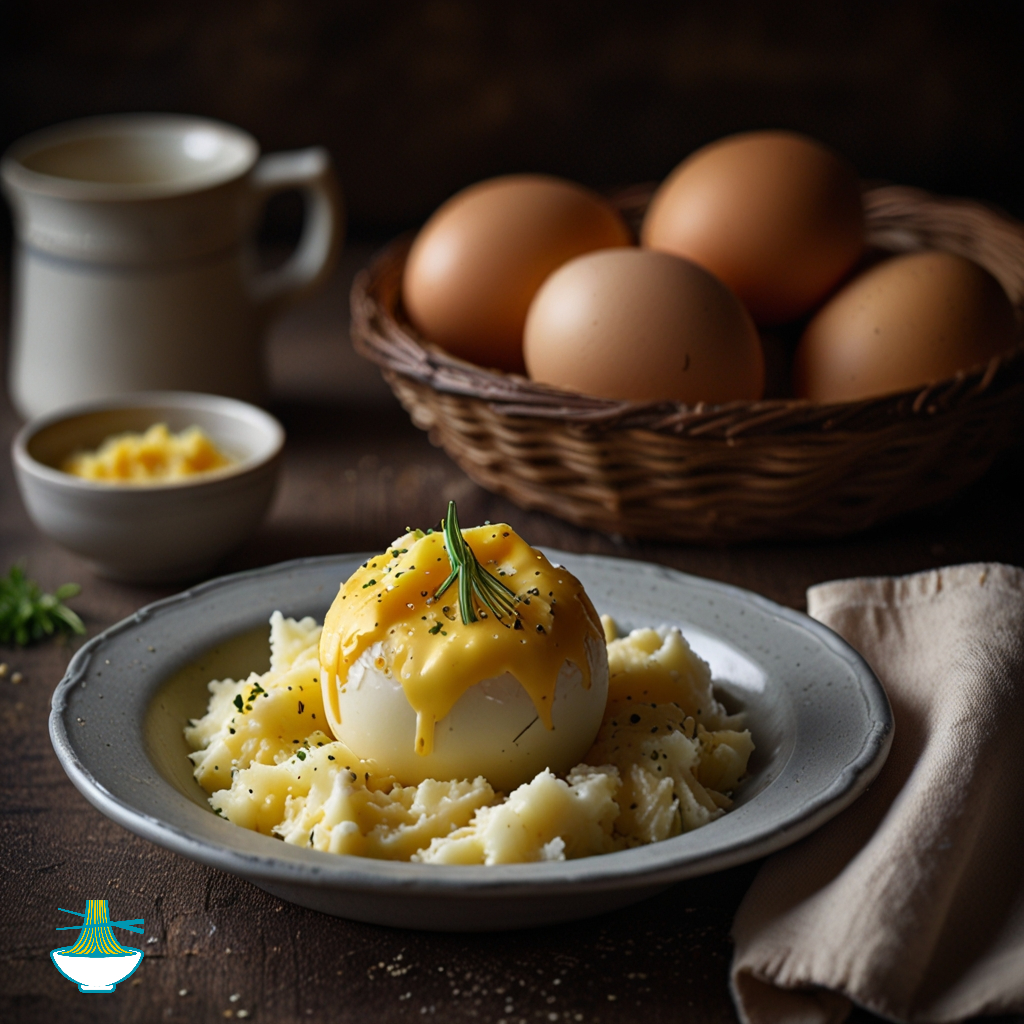"Anglesey Eggs" is a traditional Welsh dish that embodies the region's culinary heritage. It features a delightful combination of mashed potatoes, sautéed leeks, hard-boiled eggs, and a creamy cheese sauce, resulting in a comforting and flavorful meal.
The history of Anglesey Eggs traces back to Wales' rich agricultural traditions, where ingredients like potatoes and leeks were staples of local cuisine. Over time, this dish evolved into a beloved comfort food, cherished for its simplicity and hearty flavors. Today, Anglesey Eggs remain a cherished part of Welsh culinary culture, offering a taste of tradition and nostalgia with every bite.
Ingredients:
- 4 medium potatoes, peeled and diced
- 2 leeks, thinly sliced
- 4 hard-boiled eggs, peeled and chopped
- 1 cup grated cheese (such as Cheddar or Welsh cheese)
- 2 tablespoons butter
- 2 tablespoons all-purpose flour
- 1 1/2 cups milk
- Salt and pepper to taste
Method of Preparation:
1. Boil the diced potatoes until tender. Drain and mash them with a fork or potato masher.
2. In a separate pan, sauté the sliced leeks in butter until they are soft and golden.
3. Add the chopped hard-boiled eggs to the sautéed leeks and mix gently.
4. In another saucepan, melt the remaining butter over medium heat. Stir in the flour to form a roux.
5. Gradually pour in the milk while stirring continuously to create a smooth sauce. Cook until the sauce thickens.
6. Remove the saucepan from heat and stir in the grated cheese until it melts and combines with the sauce.
7. Season the cheese sauce with salt and pepper to taste.
8. Combine the mashed potatoes with the leek and egg mixture.
9. Pour the cheese sauce over the potato mixture, spreading it evenly.
10. Place the dish under a broiler for a few minutes until the cheese sauce is bubbly and lightly golden.
11. Serve hot and enjoy the comforting flavors of Anglesey Eggs!
Nutrition Value:
1. Potatoes (4 medium, peeled and diced):
- Calories: Approximately 400 kcal
- Carbohydrates: About 90 grams
- Protein: Around 10 grams
- Fat: Negligible (less than 1 gram)
- Sodium: Very low (less than 20 mg)
- Cholesterol: None
- Vitamins: High in vitamin C, vitamin B6, potassium, and fiber
- Minerals: Contains potassium, magnesium, and phosphorus
- Nutritional Benefits: Potatoes provide a good source of complex carbohydrates for energy, along with essential vitamins and minerals, especially if consumed with their skin.
2. Leeks (2, thinly sliced):
- Calories: Approximately 50 kcal
- Carbohydrates: About 10 grams
- Protein: Around 2 grams
- Fat: Negligible (less than 1 gram)
- Sodium: Low (less than 10 mg)
- Cholesterol: None
- Vitamins: High in vitamin A, vitamin K, vitamin C, and folate
- Minerals: Contains manganese, iron, and copper
- Nutritional Benefits: Leeks are low in calories and rich in vitamins and minerals, particularly vitamin A and vitamin K, which support immune function and bone health.
3. Hard-boiled Eggs (4, peeled and chopped):
- Calories: Approximately 280 kcal
- Carbohydrates: About 2 grams
- Protein: Around 24 grams
- Fat: Approximately 20 grams (mostly healthy fats)
- Sodium: Moderate (around 200 mg)
- Cholesterol: High (around 800 mg)
- Vitamins: Excellent source of vitamin B12, vitamin D, vitamin A, and riboflavin
- Minerals: Contains selenium, phosphorus, and zinc
- Nutritional Benefits: Hard-boiled eggs are rich in high-quality protein, essential vitamins, and minerals, supporting muscle growth, brain function, and overall health.
4. Grated Cheese (1 cup, such as Cheddar or Welsh cheese):
- Calories: Approximately 450 kcal
- Carbohydrates: About 2 grams
- Protein: Around 25 grams
- Fat: Approximately 35 grams (varies based on cheese type)
- Sodium: Moderate to high (depends on cheese variety)
- Cholesterol: High (around 100 mg)
- Vitamins: Contains vitamin A, vitamin B12, and calcium
- Minerals: Rich in calcium and phosphorus
- Nutritional Benefits: Cheese provides protein, calcium, and essential fats, but should be consumed in moderation due to its calorie and fat content.
5. Butter (2 tablespoons):
- Calories: Approximately 200 kcal
- Carbohydrates: About 0 grams
- Protein: Negligible
- Fat: Approximately 22 grams
- Sodium: Low (around 150 mg)
- Cholesterol: High (around 60 mg)
- Vitamins: Contains vitamin A
- Minerals: Contains small amounts of calcium and potassium
- Nutritional Benefits: Butter adds flavor and texture but is high in saturated fats and calories, so it should be used sparingly.
6. All-Purpose Flour (2 tablespoons):
- Calories: Approximately 60 kcal
- Carbohydrates: About 12 grams
- Protein: Around 2 grams
- Fat: Negligible
- Sodium: Very low (less than 5 mg)
- Cholesterol: None
- Vitamins: Contains small amounts of B vitamins
- Minerals: Contains small amounts of iron and manganese
- Nutritional Benefits: Flour provides carbohydrates for energy but has minimal nutritional value compared to whole grains.
7. Milk (1 1/2 cups):
- Calories: Approximately 150 kcal (for 1 cup)
- Carbohydrates: About 12 grams (for 1 cup)
- Protein: Around 8 grams (for 1 cup)
- Fat: Approximately 8 grams (for 1 cup, varies based on milk fat content)
- Sodium: Low (less than 100 mg for 1 cup)
- Cholesterol: Moderate (around 30 mg for 1 cup)
- Vitamins: Contains vitamin D, vitamin B12, calcium, and riboflavin
- Minerals: Rich in calcium and phosphorus
- Nutritional Benefits: Milk provides essential nutrients like calcium, protein, and vitamins, supporting bone health and overall nutrition.
8. Salt and Pepper to taste:
- Calories: Negligible
- Carbohydrates: Negligible
- Protein: Negligible
- Fat: Negligible
- Sodium: Varies based on usage
- Cholesterol: None
- Vitamins: None
- Minerals: None
- Nutritional Benefits: Salt and pepper are used for seasoning and do not contribute significant nutrients to the dish.


Comments